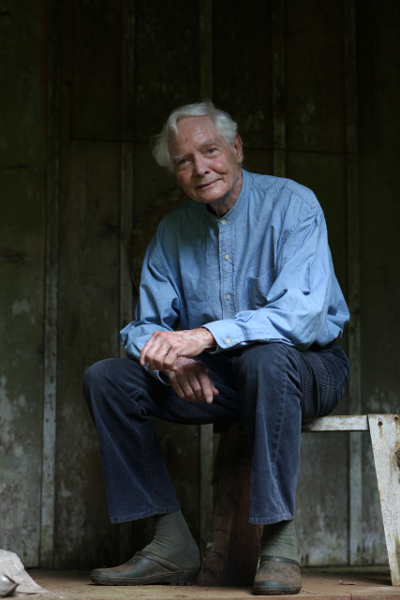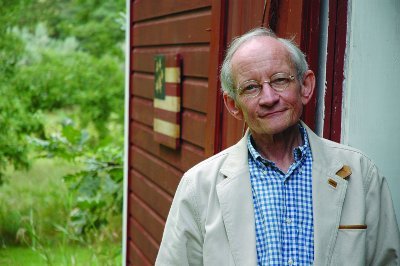
W.S. Merwin has been named the Library of Congress' 17th Poet Laureate Consultant in Poetry for 2010-11. Photo by Tom Sewell.
On July 1 Librarian of Congress James H. Billington announced the appointment of W.S. Merwin as the Library’s 17th Poet Laureate Consultant in Poetry for 2010-11.
Merwin will take up his duties in the fall, opening the library’s annual literary series on Oct. 25 with a reading of his work.
“William Merwin’s poems are often profound and, at the same time, accessible to a vast audience,” Billington said.
“He leads us upstream from the flow of everyday things in life to half-hidden headwaters of wisdom about life itself,” Billington continued. “In his poem ‘Heartland,’ Merwin seems to suggest that a land of the heart within us might help map the heartland beyond – and that this ‘map’ might be rediscovered in something like a library, where ‘it survived beyond/ what could be known at the time/ in its archaic/ untaught language/ that brings the bees to the rosemary.’”
William Stanley Merwin succeeds Kay Ryan as Poet Laureate and joins a long line of distinguished poets who have served in the position, including Charles Simic, Donald Hall, Ted Kooser, Louise Glück, Billy Collins, Stanley Kunitz, Robert Pinsky, Robert Hass, Rita Dove and Richard Wilbur.
During a 60-year writing career, Merwin has received nearly every major literary award.
He is a two-time winner of the Pulitzer Prize, just recently in 2009 for “The Shadow of Sirius” and in 1971 for “The Carrier of Ladders.”
In 2006, he won the Rebekah Johnson Bobbitt Prize from the Library of Congress for “Present Company.” His retrospective collection “Migration: New and Selected Poems” won the 2005 National Book Award for poetry.
Born in 1927, Merwin showed an early interest in language and music, writing hymns for his father, a Presbyterian minister.
He studied poetry at Princeton and, in 1952, his first book, “A Mask for Janus,” was selected by W.H. Auden for the Yale Series of Younger Poets Award.
The author of more than 30 books of poetry and prose, Merwin’s influence on American poetry is profound. Often noted by critics is his decision, in the 1960s, to relinquish the use of punctuation.
“I had come to feel that punctuation stapled the poems to the page,” Merwin wrote in his introduction to “The Second Four Books of Poems.” “Whereas I wanted the poems to evoke the spoken language, and wanted the hearing of them to be essential to taking them in.”
Merwin also has been long dedicated to translating poetry and plays from a wide array of languages, including Spanish and French. “I started translating partly as a discipline, hoping that the process might help me to learn to write.”
In 1976, Merwin moved to Hawaii, where he and his wife Paula have fashioned a quiet life in beautiful, natural surroundings. An avid gardener, he has raised endangered palm trees on land that used to be a pineapple plantation.
“Although his poems often deal with simple everyday things, there is a nourishing quality about them that makes readers want more,” said Patricia Gray, head of the Library’s Poetry and Literature Center. “Like William Wordsworth, he is passionately interested in the natural world.”
From 1999 to 2000, while Robert Pinsky served as Poet Laureate, Merwin along with Rita Dove and Louise Glück were named as Special Bicentennial Consultants in Poetry to help celebrate the Library’s bicentennial.
Merwin’s many honors also include the Bollingen Prize in Poetry, the Tanning Prize for Poetry, the Ruth Lilly Poetry Prize, the Wallace Stevens Award, the PEN Translation Prize, the Aiken Taylor Award for Modern American Poetry, and the Governor’s Award for Literature of the State of Hawaii.
He has received a Ford Foundation grant and fellowships from the Academy of American Poets, the Guggenheim Foundation, the National Endowment for the Arts and the Rockefeller Foundation. Merwin is a former chancellor of the Academy of American Poets.
The Poet Laureate is selected for a one-year term by the Librarian of Congress. The choice is based on poetic merit alone and has included a wide variety of poetic styles.
The library keeps to a minimum the specific duties required of the Poet Laureate, who opens the literary season in October and closes it in May. Laureates, in recent years, have initiated poetry projects that broaden the audiences for poetry.
Kay Ryan launched “Poetry for the Mind’s Joy” in 2009-10, a project that focused on the poetry being written by community-college students. The project included visits to various community colleges and a poetry contest on the campuses. For more information, visit www.loc.gov/poetry/mindsjoy/.
Earlier, Rita Dove brought a program of poetry and jazz to the library’s literary series, along with a reading by young Crow Indian poets and a two-day conference titled “Oil on the Waters: The Black Diaspora,” featuring panel discussions, readings and music.
Robert Hass sponsored a major conference on nature writing called “Watershed,” which continues today as a national poetry competition for elementary- and high-school students, titled “River of Words.”
Robert Pinsky initiated his Favorite Poem Project, which energized a nation of poetry readers to share their favorite poems in readings across the country and in audio and video recordings.
Billy Collins instituted the Web site Poetry 180, which brought a poem a day into every high-school classroom in all parts of the country via the central announcement system.
More recently, Ted Kooser created a free weekly newspaper column, at www.americanlifeinpoetry.org, that features a brief poem by a contemporary American poet and an introduction to the poem by Kooser.
Donald Hall participated in the first-ever joint poetry readings of the U.S. Poet Laureate and British Poet Laureate Andrew Motion in a program called “Poetry Across the Atlantic,” also sponsored by the Poetry Foundation. Charles Simic provided tips on writing at www.loc.gov/poetry/ and taught a master class for accomplished poets at the Library of Congress.
The Library of Congress’ Poetry and Literature Center is the home of the Poet Laureate Consultant in Poetry, a position that has existed since 1936, when Archer M. Huntington endowed the Chair of Poetry at the Library. Since then, many of the nation’s most eminent poets have served as Consultant in Poetry to the Library of Congress and, after the passage of Public Law 99-194 (Dec. 20, 1985), as Poet Laureate Consultant in Poetry. The Poet Laureate suggests authors to read in the literary series and plans other special events during the literary season.
Consultants in Poetry and Poets Laureate Consultants in Poetry and their terms of service are listed below.
Joseph Auslander, 1937-1941
Allen Tate, 1943-1944
Robert Penn Warren, 1944-1945
Louise Bogan, 1945-1946
Karl Shapiro, 1946-1947
Robert Lowell, 1947-1948
Leonie Adams, 1948-1949
Elizabeth Bishop, 1949-1950
Conrad Aiken, 1950-1952, the first to serve two terms
William Carlos Williams, appointed in 1952 but did not serve
Randall Jarrell, 1956-1958
Robert Frost, 1958-1959
Richard Eberhart, 1959-1961
Louis Untermeyer, 1961-1963
Howard Nemerov, 1963-1964
Reed Whittemore, 1964-1965
Stephen Spender, 1965-1966
James Dickey, 1966-1968
William Jay Smith, 1968-1970
William Stafford, 1970-1971
Josephine Jacobsen, 1971-1973
Daniel Hoffman, 1973-1974
Stanley Kunitz, 1974-1976
Robert Hayden, 1976-1978
William Meredith, 1978-1980
Maxine Kumin, 1981-1982
Anthony Hecht, 1982-1984
Robert Fitzgerald, 1984-1985, appointed and served in a health-limited capacity, but did not come to the Library of Congress
Reed Whittemore, 1984-1985, Interim Consultant in Poetry
Gwendolyn Brooks, 1985-1986
Robert Penn Warren, 1986-1987, first to be Poet Laureate Consultant in Poetry
Richard Wilbur, 1987-1988
Howard Nemerov, 1988-1990
Mark Strand, 1990-1991
Joseph Brodsky, 1991-1992
Mona Van Duyn, 1992-1993
Rita Dove, 1993-1995
Robert Hass, 1995-1997
Robert Pinsky, 1997-2000
Stanley Kunitz, 2000-2001
Billy Collins, 2001-2003
Louise Glück, 2003-2004
Ted Kooser, 2004-2006
Donald Hall, 2006-2007
Charles Simic, 2007-2008
Kay Ryan, 2008-2010
Founded in 1800, the Library of Congress is the nation’s oldest federal cultural institution. It seeks to spark imagination and creativity and to further human understanding and wisdom by providing access to knowledge through its magnificent collections, programs and exhibitions. Many of the library’s rich resources can be accessed through its Web site at www.loc.gov and via interactive exhibitions on a personalized website at www.myLOC.gov.











